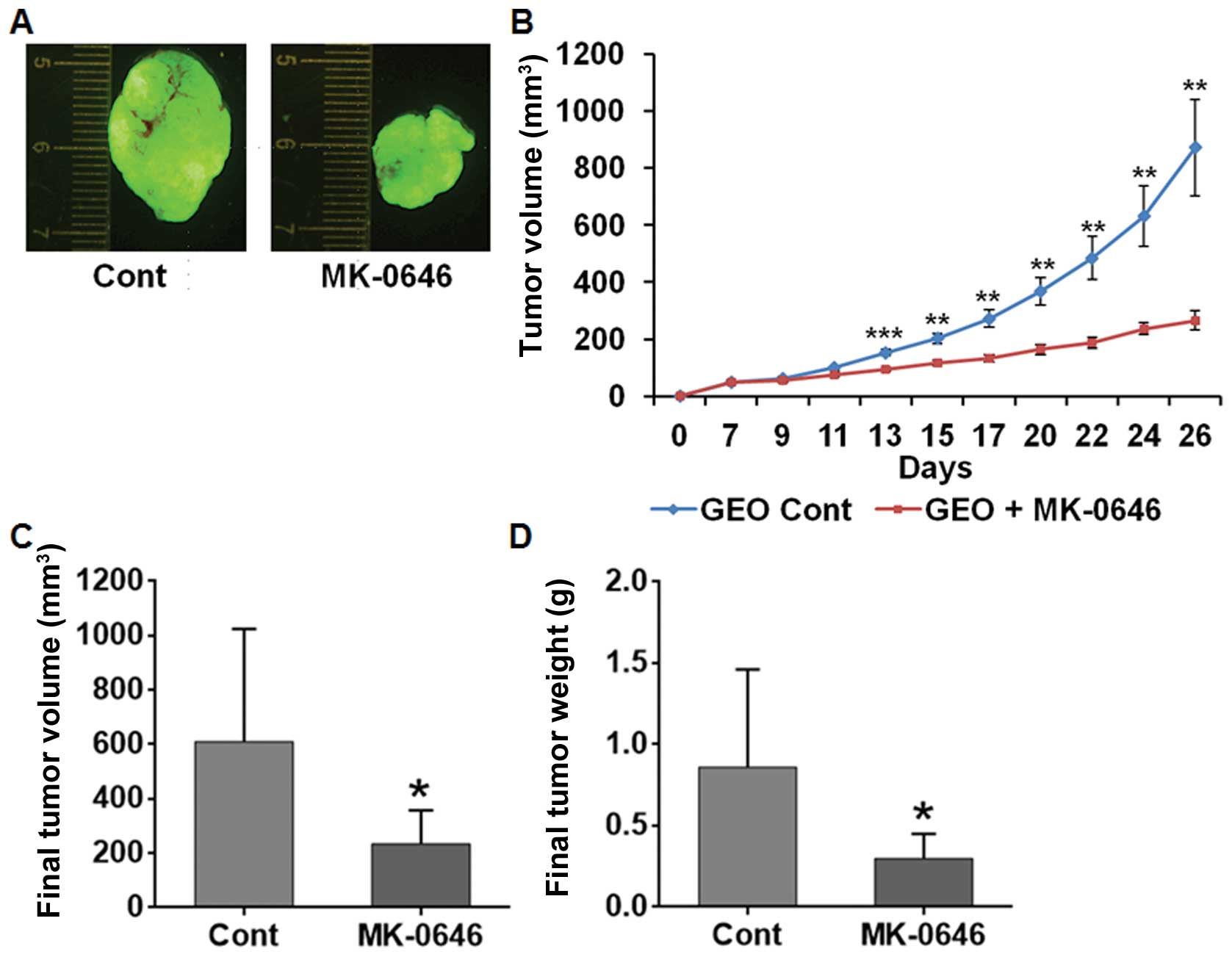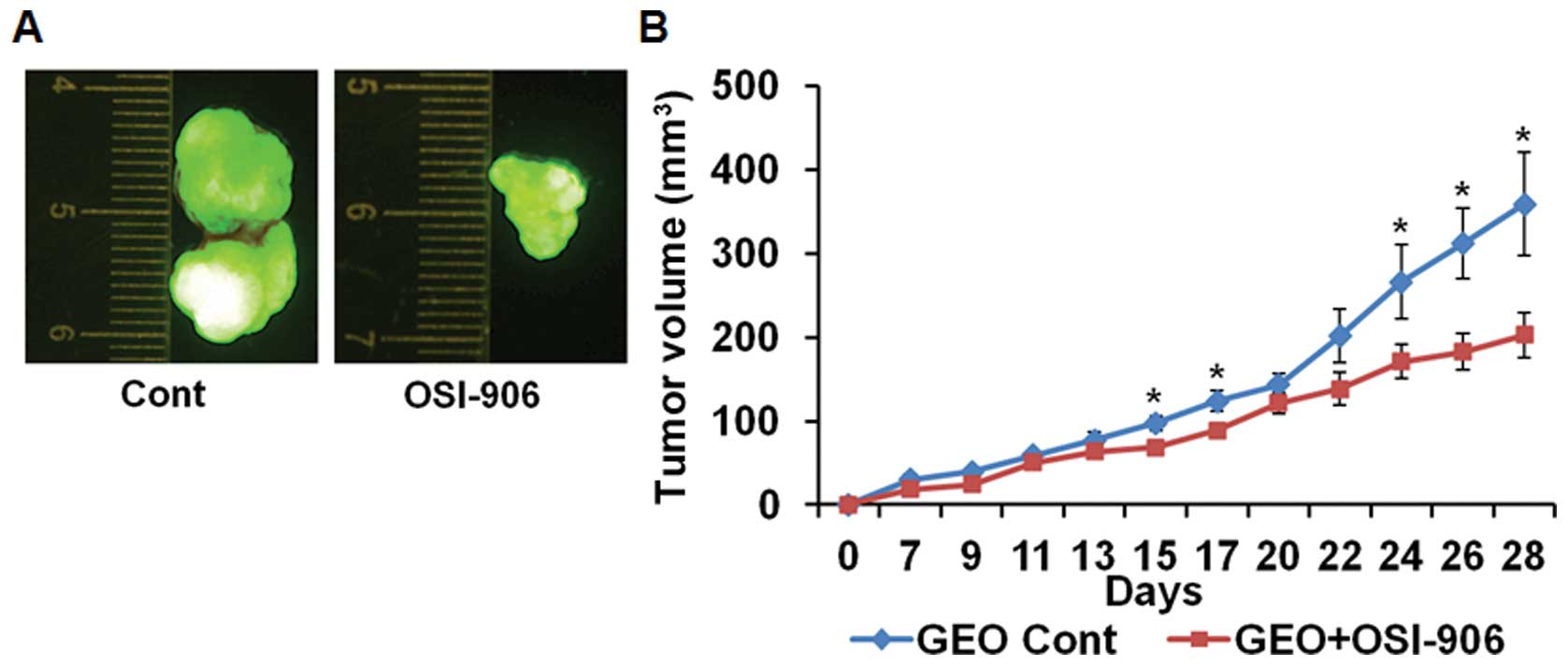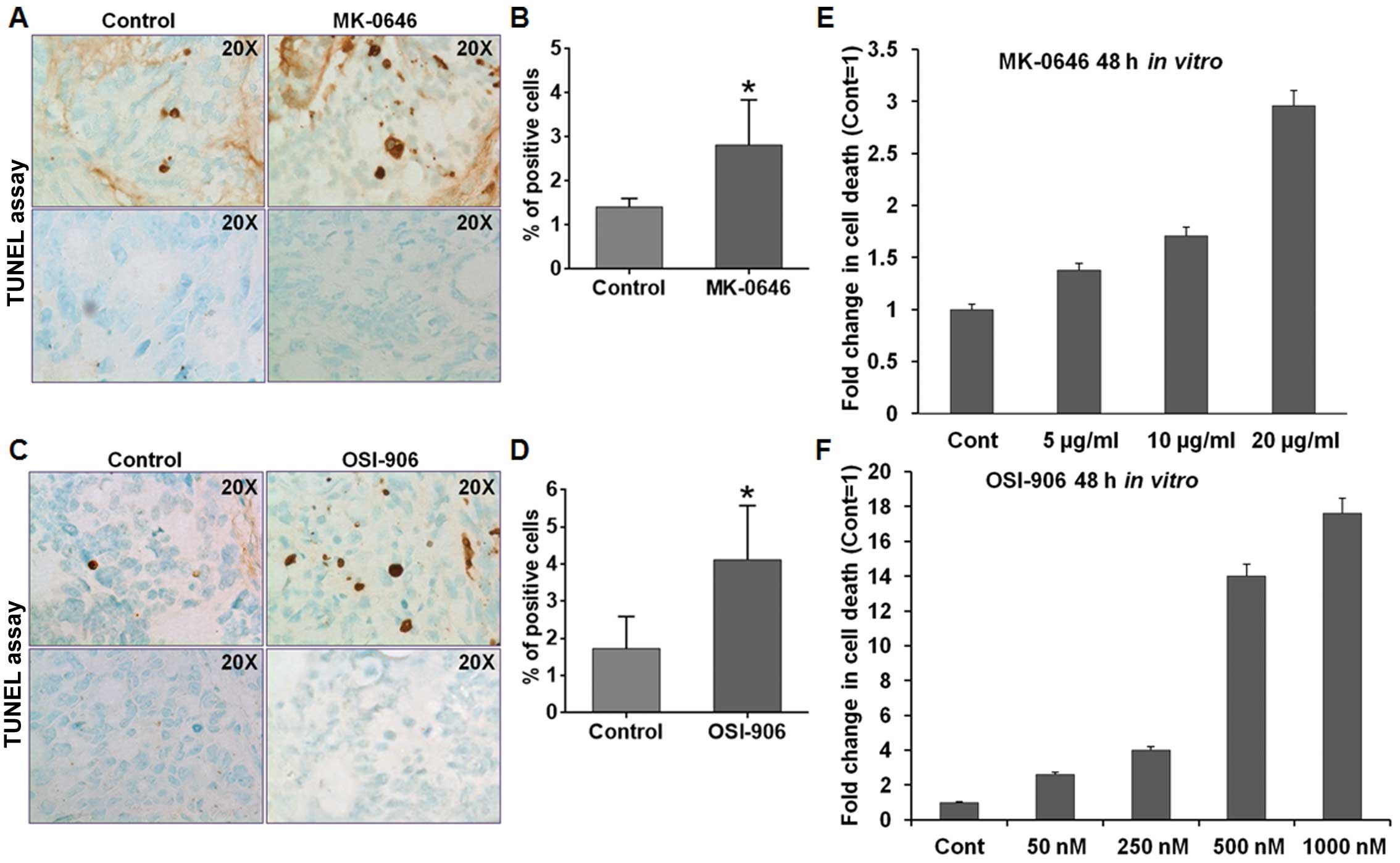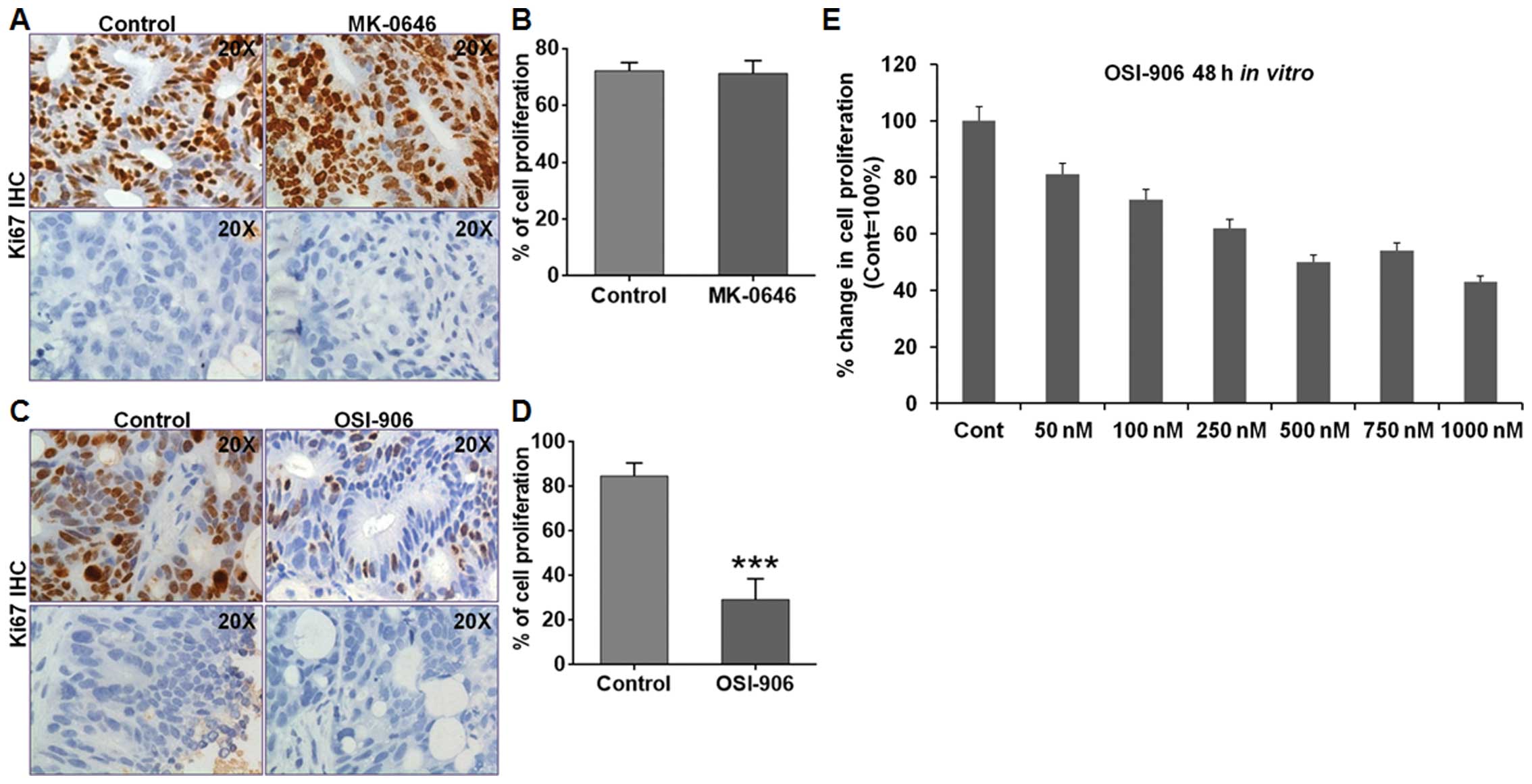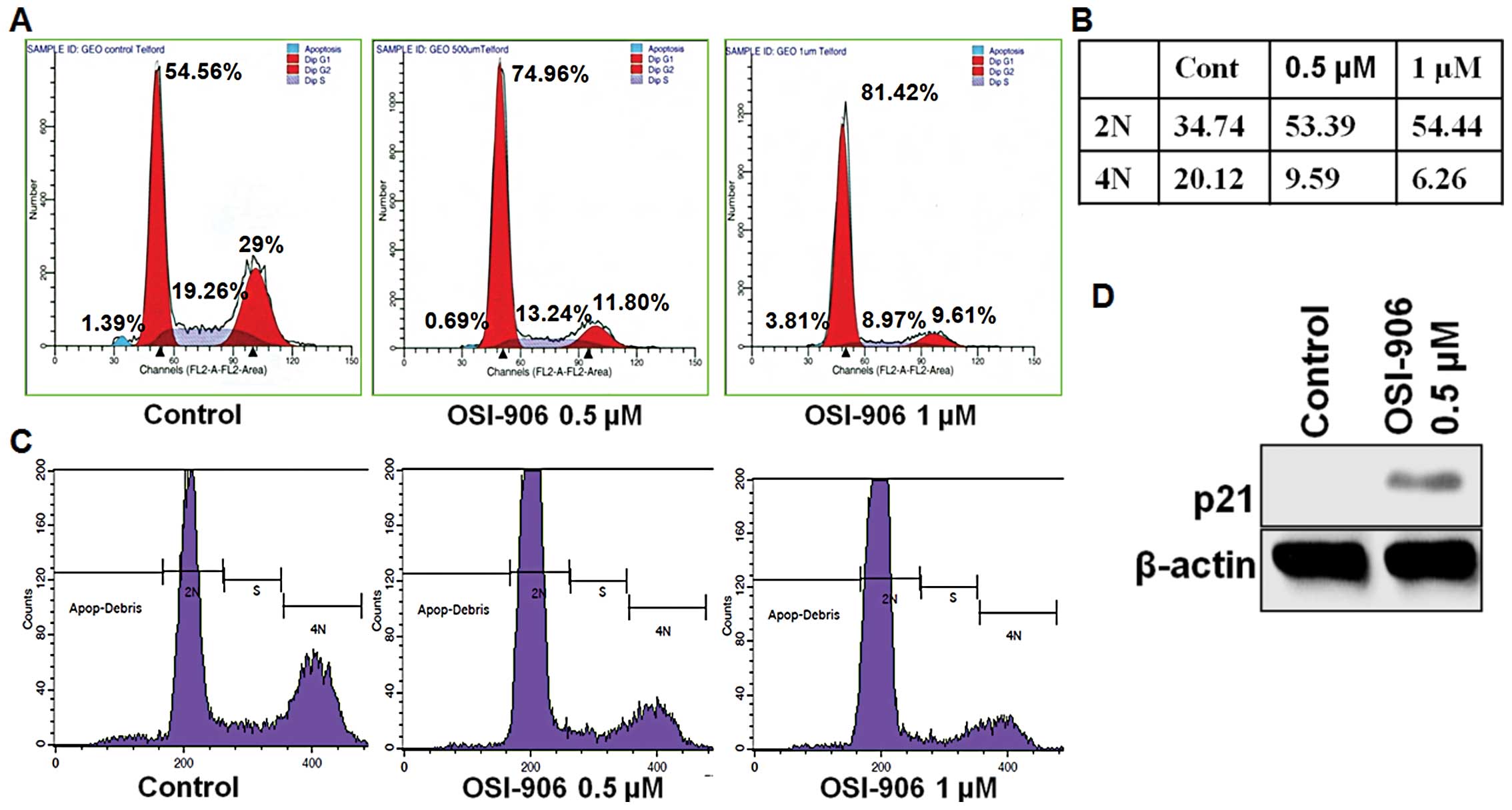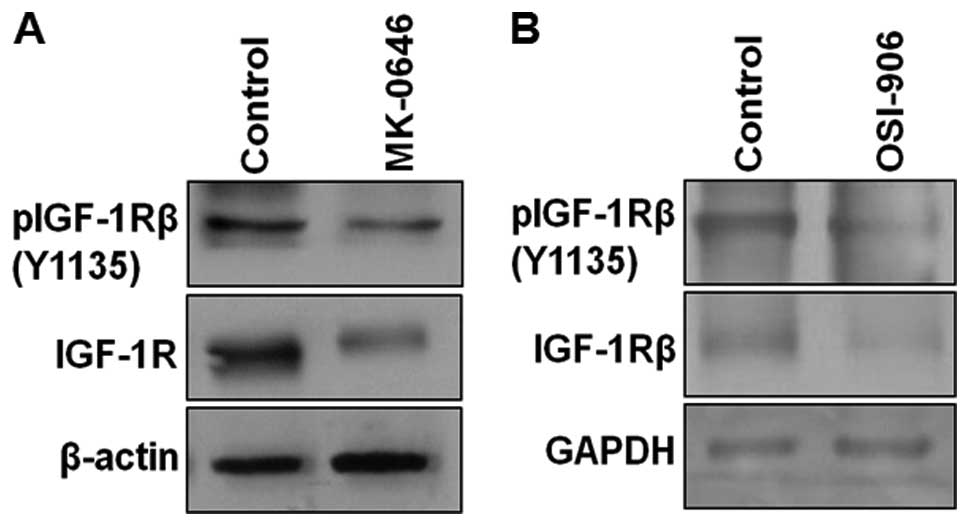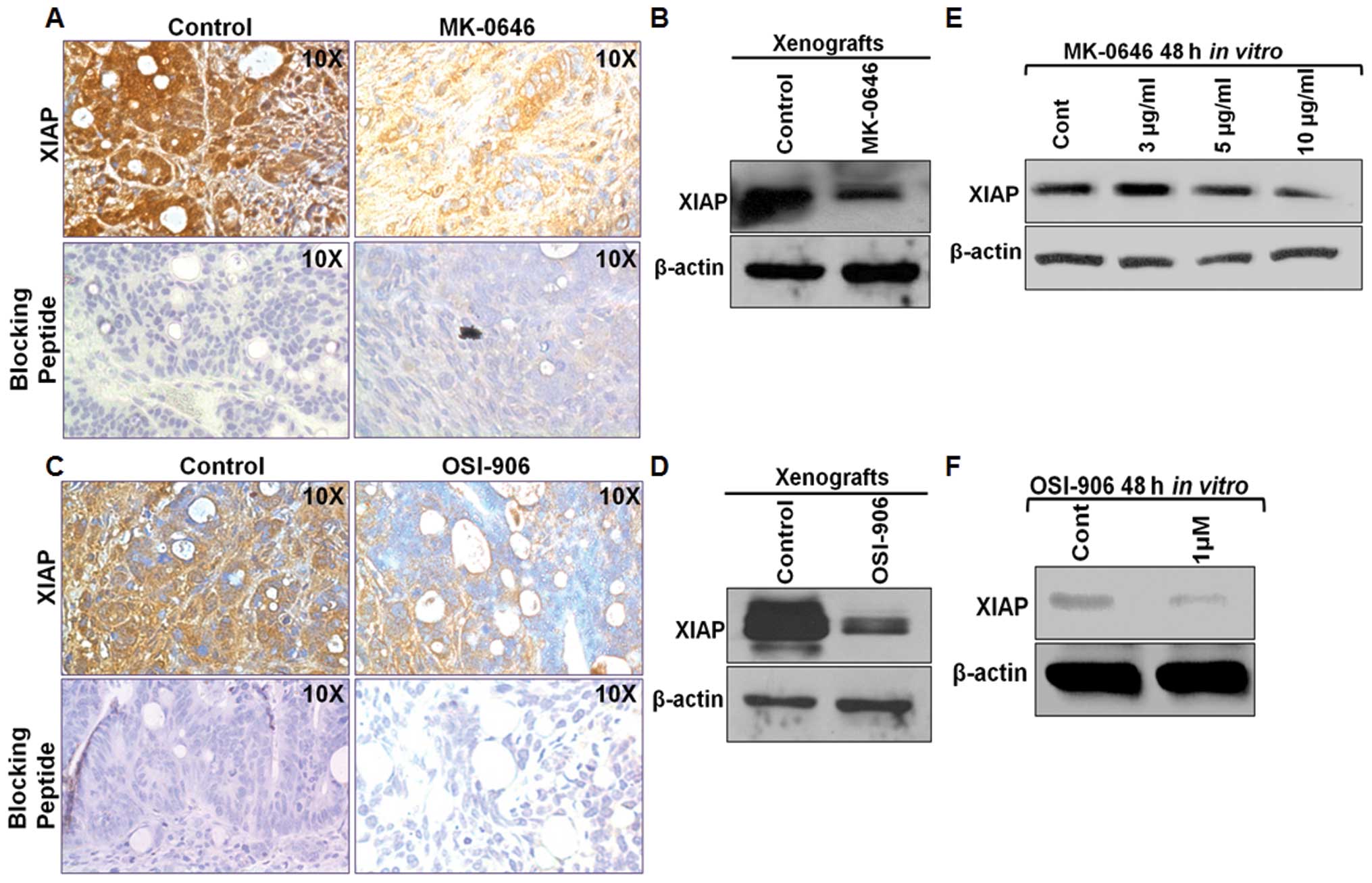|
1
|
Weber MM, Fottner C, Liu SB, Jung MC,
Engelhardt D and Baretton GB: Overexpression of the insulin-like
growth factor I receptor in human colon carcinomas. Cancer.
95:2086–2095. 2002. View Article : Google Scholar : PubMed/NCBI
|
|
2
|
Maloney EK, McLaughlin JL, Dagdigian NE,
et al: An anti-insulin growth factor I receptor antibody that is a
potent inhibitor of cancer cell proliferation. Cancer Res.
63:5073–5083. 2003.PubMed/NCBI
|
|
3
|
Peters G, Gongoll S, Langner C, et al:
IGF-1R, IGF-1 and IGF-2 expression as potential prognostic and
predictive markers in colorectal-cancer. Virchows Arch.
443:139–145. 2003. View Article : Google Scholar : PubMed/NCBI
|
|
4
|
Ewing GP and Goff LW: The insulin-like
growth factor signaling pathway as a target for treatment of
colorectal carcinoma. Clin Colorectal Cancer. 9:219–223. 2010.
View Article : Google Scholar : PubMed/NCBI
|
|
5
|
Asghar U, Hawkes E and Cunningham D:
Predictive and prognostic biomarkers for targeted therapy in
metastatic colorectal cancer. Clin Colorectal Cancer. 9:274–281.
2010. View Article : Google Scholar : PubMed/NCBI
|
|
6
|
McKinley ET, Bugaj JE, Zhao P, et al:
18FDG-PET predicts pharmacodynamic response to OSI-906, a dual
IGF-1R/IR inhibitor, in preclinical mouse models of lung cancer.
Clin Cancer Res. 17:3332–3340. 2011. View Article : Google Scholar : PubMed/NCBI
|
|
7
|
Goetsch L, Gonzalez A, Leger O, et al: A
recombinant humanized anti-insulin-like growth factor receptor type
I antibody (h7C10) enhances the antitumor activity of vinorelbine
and anti-epidermal growth factor receptor therapy against human
cancer xenografts. Int J Cancer. 113:316–328. 2005. View Article : Google Scholar
|
|
8
|
Allison AS, McIntyre MA, McArdle C and
Habib FK: The insulin-like growth factor type 1 receptor and
colorectal neoplasia: insights into invasion. Hum Pathol.
38:1590–1602. 2007. View Article : Google Scholar : PubMed/NCBI
|
|
9
|
Pollak MN, Schernhammer ES and Hankinson
SE: Insulin-like growth factors and neoplasia. Nat Rev Cancer.
4:505–518. 2004. View
Article : Google Scholar : PubMed/NCBI
|
|
10
|
Chowdhury S, Dominguez I, Sharratt E,
Spernyak J, Brattain MG and Rajput A: Anti-tumor activity of IGF-1R
kinase inhibitor PQIP in colon cancer. Clin Exp Pharmacol.
S4:0052013.
|
|
11
|
Donovan EA and Kummar S: Role of
insulin-like growth factor-1R system in colorectal carcinogenesis.
Crit Rev Oncol Hematol. 66:91–98. 2008. View Article : Google Scholar : PubMed/NCBI
|
|
12
|
Atzori F, Traina TA, Ionta MT and Massidda
B: Targeting insulin-like growth factor type 1 receptor in cancer
therapy. Target Oncol. 4:255–266. 2009. View Article : Google Scholar : PubMed/NCBI
|
|
13
|
Reidy-Lagunes DL, Vakiani E, Segal MF, et
al: A phase 2 study of the insulin-like growth factor-1 receptor
inhibitor MK-0646 in patients with metastatic, well-differentiated
neuroendocrine tumors. Cancer. 118:4795–4800. 2012. View Article : Google Scholar : PubMed/NCBI
|
|
14
|
Reichert JM: Antibody-based therapeutics
to watch in 2011. MAbs. 3:76–99. 2011. View Article : Google Scholar : PubMed/NCBI
|
|
15
|
King ER and Wong KK: Insulin-like growth
factor: current concepts and new developments in cancer therapy.
Recent Pat Anticancer Drug Discov. 7:14–30. 2012. View Article : Google Scholar : PubMed/NCBI
|
|
16
|
Heidegger I, Pircher A, Klocker H and
Massoner P: Targeting the insulin-like growth factor network in
cancer therapy. Cancer Biol Ther. 11:701–707. 2011. View Article : Google Scholar : PubMed/NCBI
|
|
17
|
Mulvihill MJ, Cooke A, Rosenfeld-Franklin
M, et al: Discovery of OSI-906: a selective and orally efficacious
dual inhibitor of the IGF-1 receptor and insulin receptor. Future
Med Chem. 1:1153–1171. 2009. View Article : Google Scholar : PubMed/NCBI
|
|
18
|
Buck E, Gokhale PC, Koujak S, et al:
Compensatory insulin receptor (IR) activation on inhibition of
insulin-like growth factor-1 receptor (IGF-1R): rationale for
cotargeting IGF-1R and IR in cancer. Mol Cancer Ther. 9:2652–2664.
2010. View Article : Google Scholar : PubMed/NCBI
|
|
19
|
Brattain MG, Levine AE, Chakrabarty S,
Yeoman LC, Willson JK and Long B: Heterogeneity of human colon
carcinoma. Cancer Metastasis Rev. 3:177–191. 1984. View Article : Google Scholar
|
|
20
|
Boyd DD, Levine AE, Brattain DE, McKnight
MK and Brattain MG: Comparison of growth requirements of two human
intratumoral colon carcinoma cell lines in monolayer and soft
agarose. Cancer Res. 48:2469–2474. 1988.PubMed/NCBI
|
|
21
|
Wang J, Yang L, Yang J, et al:
Transforming growth factor beta induces apoptosis through
repressing the phosphoinositide 3-kinase/AKT/survivin pathway in
colon cancer cells. Cancer Res. 68:3152–3160. 2008. View Article : Google Scholar : PubMed/NCBI
|
|
22
|
Hu YP, Patil SB, Panasiewicz M, et al:
Heterogeneity of receptor function in colon carcinoma cells
determined by cross-talk between type I insulin-like growth factor
receptor and epidermal growth factor receptor. Cancer Res.
68:8004–8013. 2008. View Article : Google Scholar : PubMed/NCBI
|
|
23
|
Vanamala J, Reddivari L, Radhakrishnan S
and Tarver C: Resveratrol suppresses IGF-1 induced human colon
cancer cell proliferation and elevates apoptosis via suppression of
IGF-1R/Wnt and activation of p53 signaling pathways. BMC Cancer.
10:2382010. View Article : Google Scholar : PubMed/NCBI
|
|
24
|
Nakane PK: Recent progress in the
peroxidase-labeled antibody method. Ann NY Acad Sci. 254:203–211.
1975. View Article : Google Scholar : PubMed/NCBI
|
|
25
|
Peruzzi F, Prisco M, Dews M, et al:
Multiple signaling pathways of the insulin-like growth factor 1
receptor in protection from apoptosis. Mol Cell Biol. 19:7203–7215.
1999.PubMed/NCBI
|
|
26
|
Ouban A, Muraca P, Yeatman T and Coppola
D: Expression and distribution of insulin-like growth factor-1
receptor in human carcinomas. Hum Pathol. 34:803–808. 2003.
View Article : Google Scholar : PubMed/NCBI
|
|
27
|
Myers MG Jr, Grammer TC, Wang LM, et al:
Insulin receptor substrate-1 mediates phosphatidylinositol
3′-kinase and p70S6k signaling during insulin, insulin-like growth
factor-1, and interleukin-4 stimulation. J Biol Chem.
269:28783–28789. 1994.
|
|
28
|
Kennedy SG, Wagner AJ, Conzen SD, et al:
The PI 3-kinase/Akt signaling pathway delivers an anti-apoptotic
signal. Genes Dev. 11:701–713. 1997. View Article : Google Scholar : PubMed/NCBI
|
|
29
|
Dan HC, Sun M, Kaneko S, et al: Akt
phosphorylation and stabilization of X-linked inhibitor of
apoptosis protein (XIAP). J Biol Chem. 279:5405–5412. 2004.
View Article : Google Scholar : PubMed/NCBI
|
|
30
|
Chowdhury S, Howell GM, Rajput A, et al:
Identification of a novel TGFbeta/PKA signaling transduceome in
mediating control of cell survival and metastasis in colon cancer.
PLoS One. 6:e193352011. View Article : Google Scholar : PubMed/NCBI
|
|
31
|
Dohi T, Xia F and Altieri DC:
Compartmentalized phosphorylation of IAP by protein kinase A
regulates cytoprotection. Mol Cell. 27:17–28. 2007. View Article : Google Scholar : PubMed/NCBI
|
|
32
|
Chowdhury S, Howell GM, Teggart CA, et al:
Histone deacetylase inhibitor belinostat represses survivin
expression through reactivation of transforming growth factor beta
(TGFbeta) receptor II leading to cancer cell death. J Biol Chem.
286:30937–30948. 2011. View Article : Google Scholar
|
|
33
|
Watson DS, Brotherick I, Shenton BK,
Wilson RG and Campbell FC: Growth dysregulation and p53
accumulation in human primary colorectal cancer. Br J Cancer.
80:1062–1068. 1999. View Article : Google Scholar : PubMed/NCBI
|
|
34
|
Gryfe R, Swallow C, Bapat B, Redston M,
Gallinger S and Couture J: Molecular biology of colorectal cancer.
Curr Probl Cancer. 21:233–300. 1997. View Article : Google Scholar
|
|
35
|
Moschos SJ and Mantzoros CS: The role of
the IGF system in cancer: from basic to clinical studies and
clinical applications. Oncology. 63:317–332. 2002. View Article : Google Scholar : PubMed/NCBI
|
|
36
|
Sulkowski S, Kanczuga-Koda L, Koda M,
Wincewicz A and Sulkowska M: Insulin-like growth factor-I receptor
correlates with connexin 26 and Bcl-xL expression in human
colorectal cancer. Ann NY Acad Sci. 1090:265–275. 2006. View Article : Google Scholar : PubMed/NCBI
|
|
37
|
Wu KD, Zhou L, Burtrum D, Ludwig DL and
Moore MA: Antibody targeting of the insulin-like growth factor I
receptor enhances the anti-tumor response of multiple myeloma to
chemotherapy through inhibition of tumor proliferation and
angiogenesis. Cancer Immunol Immunother. 56:343–357.
2007.PubMed/NCBI
|
|
38
|
Hakam A, Yeatman TJ, Lu L, et al:
Expression of insulin-like growth factor-1 receptor in human
colorectal cancer. Hum Pathol. 30:1128–1133. 1999. View Article : Google Scholar : PubMed/NCBI
|
|
39
|
Reinmuth N, Liu W, Fan F, et al: Blockade
of insulin-like growth factor I receptor function inhibits growth
and angiogenesis of colon cancer. Clin Cancer Res. 8:3259–3269.
2002.PubMed/NCBI
|
|
40
|
Sachdev D and Yee D: The IGF system and
breast cancer. Endocr Relat Cancer. 8:197–209. 2001. View Article : Google Scholar
|
|
41
|
Surmacz E: Function of the IGF-I receptor
in breast cancer. J Mammary Gland Biol Neoplasia. 5:95–105. 2000.
View Article : Google Scholar : PubMed/NCBI
|
|
42
|
Buck E, Eyzaguirre A, Rosenfeld-Franklin
M, et al: Feedback mechanisms promote cooperativity for small
molecule inhibitors of epidermal and insulin-like growth factor
receptors. Cancer Res. 68:8322–8332. 2008. View Article : Google Scholar : PubMed/NCBI
|
|
43
|
Gualberto A and Karp DD: Development of
the monoclonal antibody figitumumab, targeting the insulin-like
growth factor-1 receptor, for the treatment of patients with
non-small-cell lung cancer. Clin Lung Cancer. 10:273–280. 2009.
View Article : Google Scholar : PubMed/NCBI
|
|
44
|
Shang Y, Mao Y, Batson J, et al:
Antixenograft tumor activity of a humanized anti-insulin-like
growth factor-I receptor monoclonal antibody is associated with
decreased AKT activation and glucose uptake. Mol Cancer Ther.
7:2599–2608. 2008. View Article : Google Scholar : PubMed/NCBI
|
|
45
|
Zha J and Lackner MR: Targeting the
insulin-like growth factor receptor-1R pathway for cancer therapy.
Clin Cancer Res. 16:2512–2517. 2010. View Article : Google Scholar : PubMed/NCBI
|
|
46
|
Chitnis MM, Yuen JS, Protheroe AS, Pollak
M and Macaulay VM: The type 1 insulin-like growth factor receptor
pathway. Clin Cancer Res. 14:6364–6370. 2008. View Article : Google Scholar : PubMed/NCBI
|
|
47
|
Agarwal E, Brattain MG and Chowdhury S:
Cell survival and metastasis regulation by Akt signaling in
colorectal cancer. Cell Signal. 25:1711–1719. 2013. View Article : Google Scholar : PubMed/NCBI
|
|
48
|
Mehrotra S, Languino LR, Raskett CM,
Mercurio AM, Dohi T and Altieri DC: IAP regulation of metastasis.
Cancer Cell. 17:53–64. 2010. View Article : Google Scholar
|















